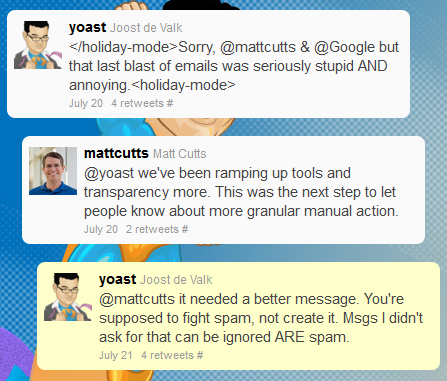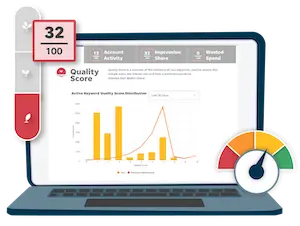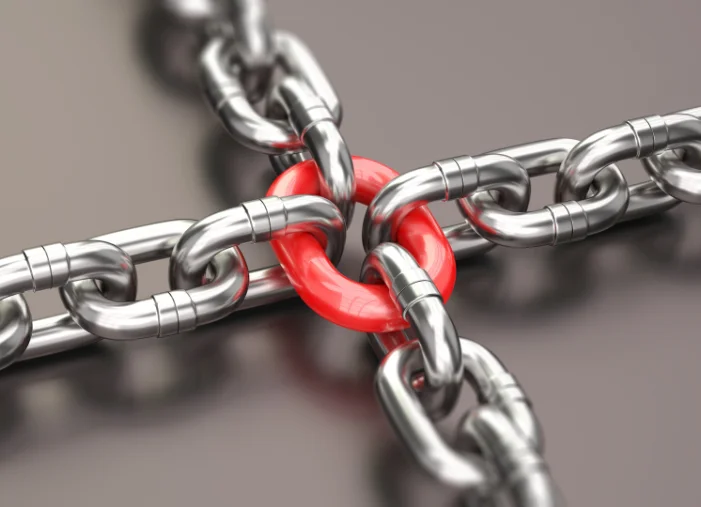
Unnatural Links: What They Are & What to Do About Them
Latest Google Penguin Update Sends Slew of Unnatural Link Warnings
In “a step towards transparency,” Google webmasters initiated a series of warnings to sites against spammy activity and sketchy, manipulative links better known as unnatural links. On July 19, a confusing link warning was sent to a large number of sites. Google’s Matt Cutts posted on his Google+ account soon after to address the SEO hysteria:
If you received a message yesterday about unnatural links to your site, don’t panic. In the past, these messages were sent when we took action on a site as a whole … For example we may take this kind of targeted action to distrust hacked links pointing to an innocent site. The innocent site will get the message as we move towards more transparency, but it’s not necessarily something that you automatically need to worry about.
Despite the internet storm the announcement caused among SEO’s, some marketers were left wondering, what exactly is an unnatural link? Generally, unnatural links are artificial links mainly intended to manipulate a page’s ranking. These can include purchased links or links created by scrapers and spammers that attach themselves to your site under the radar and potentially link your site to another in a bad neighborhood of the internet.
Unnatural links became a Google target after their Penguin update in mid-April of 2012. The algorithm update was established to penalize sites for low-quality links, over-optimized anchor text and keyword stuffing – all tactics that Google considers unfair and unbeneficial to users. As a result of the recent upgrade, all negative SEO and questionable page ranking tactics have been targeted, but at what cost?
Why Unnatural Links Are Harming Small Businesses
If Google is suspicious of a site they can take manual action, where a member of the support team manually delists the site from the search results. When a warning is sent out to a site it is given a time frame of about six months to alter and delete malignant unnatural links. The owners of the site are then urged to submit a reconsideration request. Without this request the site will reach its expiration date.
After a site is tagged for unnatural links their rankings on search engine pages will generally dramatic decrease, and this can have a drastic affect on small businesses that operate online. Small companies without SEO technicians to help the company’s products fall into the lap of the searcher and work to to dissolve unnatural links are then left at the mercy of dropping search results. Without this key lead generation channel, many small businesses are doomed.
Bloggers React to Unnatural Link Warnings
There has been a negative backlash from bloggers in the SEO realm against Google’s message. SEO’s have been hit hard as a result of the update because companies rely on them for rankings and traffic. Many marketers have been tweeting at Cutts for an improved update that would assist SEO instead of harming it.
Matt Cutts Addresses Link Warnings in Blog Post
On Friday afternoon, Cutts authored a post on the Webmaster Central blog explaining the warnings. He said that these messages indicate that Google is taking action on individual links, rather than the site as a whole:
In less severe cases, we sometimes target specific spammy or artificial links created as part of a link scheme and distrust only those links, rather than taking action on a site’s overall ranking. The new messages make it clear that we are taking “targeted action on the unnatural links instead of your site as a whole.”
Cutts also defines what Google is identifying as “spammy or artificial links”: “widgetbait, paid links, blog spam, guestbook spam, excessive article directory submissions, excessive link exchanges, other types of linkspam, etc.”
What Can Small Business Do About Unnatural Links?
What affected businesses can do to improve their rankings on search engine pages and site traffic is to begin a detox of unnatural links from their individual sites. You can download your backlinks and sort by date to get an idea of what kind of recent link activity is attached to your site.
It is particularly beneficial for businesses to utilize the Google Webmaster Guidelines located on the Google support page to distinguish what is profitable for page rankings and what will lower a site’s ranking.
For instance on Google’s support page they frown against most but not all purchased links – since all purchased links are unnatural. Google advises webmasters to include a “rel=nofollow” attribute on links purchased for advertising, so they know the link isn’t intended to manipulate search results. Alternatively those links can be redirected to an intermediate page that is blocked from search engines with a robots.txt file.
Another way for companies to stay in Google’s search results and good graces is to hire trained personnel to get unnatural links deleted, or, as an economically friendlier option, utilize sites such as deletebacklinks.com, linkdelete.com and removeem.com. These sites claim to specialize in assisting other sites that have run into trouble with unnatural links – but tread cautiously. You want to be very careful not to delete natural, beneficial links, because destroying your link profile could have an equally negative effect on your site’s rankings.
Last but not least, the best and preferred method is to build reputable backlinks. At WordStream, we believe that any given website is going to get hit by bad links. What’s important is to have a steady stream of healthy backlinks from legitimate sources to balance out the ratio of bad links your website recieves. To do this, you will need to have a strong content strategy in place that continually impresses your site’s visitors so they’ll want to link to your website.









Comments
Please read our Comment Policy before commenting.